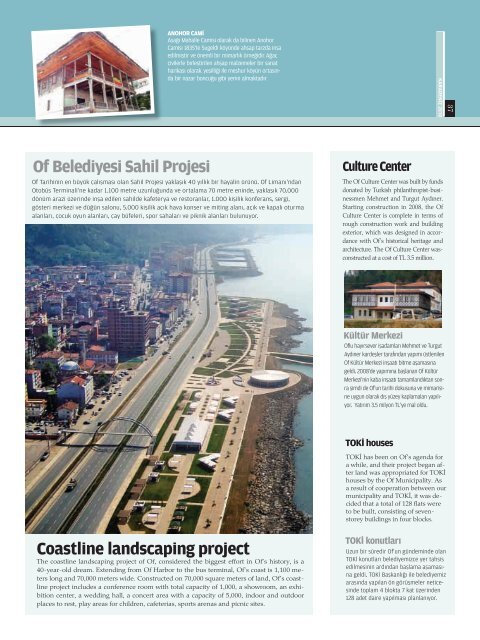The Black Sea region - Today's Zaman
The Black Sea region - Today's Zaman
The Black Sea region - Today's Zaman
- No tags were found...
You also want an ePaper? Increase the reach of your titles
YUMPU automatically turns print PDFs into web optimized ePapers that Google loves.
Sorrow of the <strong>Black</strong> <strong>Sea</strong>MÜMTAZ ER TÜRKÖNE** Siyaset bilimciPolitical scientistARTICLEBLACK SEA 201018A Russian fishing vessel nears the Sinopcoast during the Cold War. <strong>The</strong> CoastGuard arrests the captain and the crew.<strong>The</strong>y are brought to the public prosecutor.An official gives a very important hint tothe prosecutor before bringing in the detainees:“Mister Prosecutor, I swear toGod that they drink tea and eat just likeus.” This is a real story. That prosecutor isthe father of one of my friends. He narratedthe story to me, hearing it from his father.This is the moral I took from the story:People who live by leaning their chestsinto the strong wings of the <strong>Black</strong> <strong>Sea</strong> resembleeach other, whichever nation theybelong to. <strong>The</strong>y just may not realize it.<strong>The</strong>re is a wind that blows in Anatoliacalled the samyeli. No matter which raceone belongs to, the face of a person whois exposed to that wind for three monthsgets tanned, and that person starts to looklike others who are also exposed to thewind. So much so that you cannot see thedifference between a blonde person withblue eyes and a darker-colored person.<strong>The</strong> sun makes people of the same geographylook alike. Not only geography, butfate is shared by people, too.My close friend Ragıp Karcı, who is apoet from Şanlıurfa's Siverek district,adores the folk songs of the <strong>Black</strong> <strong>Sea</strong>. Hetold me the features of these songs, whichI had not realized before. Heartbreakingsongs from Anatolia are always the voicedforms of sorrow and pain. Even the folkdances are sorrowful. Just like Misket, afamous folk dance from Ankara that is alament for a young girl named Misket.While two young men are fighting for thelove of that girl, she climbs a tree to watchthe fight. <strong>The</strong>n she gets excited, falls fromthe tree and soon dies.“Melâl” is the darkest color of painand grief, and the most refined and deepeststate of sorrow. “Maî Deniz” (Blue<strong>Sea</strong>), a poem by Ahmet Haşim, culminateswith the following verses: “<strong>The</strong> bluesea, which has become a harbor of darknessand mental woes that had congregatedon the beauty” of a beautiful woman,“who looks at the horizon ofDamascus with the melâl of longing forher home / We spurn the generationwhich knows nothing of melâl.”Karcı says among all the Anatoliansongs, the <strong>Black</strong> <strong>Sea</strong> songs harbor thedarkest melâl. I listened to some <strong>Black</strong> <strong>Sea</strong>songs with his words in mind and agreedwith him. Melâl, the darkest grief, is feltmost strongly in these songs, whichsound monotonous and seems as thoughdifferent lyrics are applied to the samemelody. I thought about the difference. Inthe sorrowful songs of Anatolia, there is alament for a young man who was trappedand an uprising against an incurable disease.<strong>The</strong> loneliness and gloom of beingaway is like that. Anger, an obligation anda rage… But in the <strong>Black</strong> <strong>Sea</strong>, there is onlydespair and submission. You will turnagainst the mountains, some of which areas steep as 90 degrees, and you will shedtears for your children drowned in the<strong>Black</strong> <strong>Sea</strong>, which seems endless. Can youfeel rage towards the majesty of the <strong>Black</strong><strong>Sea</strong>? You can only reproach it, saying,“You, <strong>Black</strong> <strong>Sea</strong>…” In order to understandthis deep melâl, it is enough to lookat the <strong>Black</strong> <strong>Sea</strong> once in misty weather.<strong>The</strong> <strong>Black</strong> <strong>Sea</strong> <strong>region</strong> is always a plusfor Turkey. In the depths stands a geographyas strong as a rock. In the heights, onlythe <strong>Black</strong> <strong>Sea</strong> can point to what you canhope and which destination you can reach.All the pluses of this formidable edifice belongto those who dream by looking at thedark waters of the <strong>Black</strong> <strong>Sea</strong>. I am sure thatthe same is valid for all the countries thathave coasts on the <strong>Black</strong> <strong>Sea</strong>.Looking at Turkey from the <strong>Black</strong><strong>Sea</strong> and perceiving the world as it looksfrom the <strong>Black</strong> <strong>Sea</strong> always shows a stepbeyond the current day and sometimeseven beyond dreams.

















